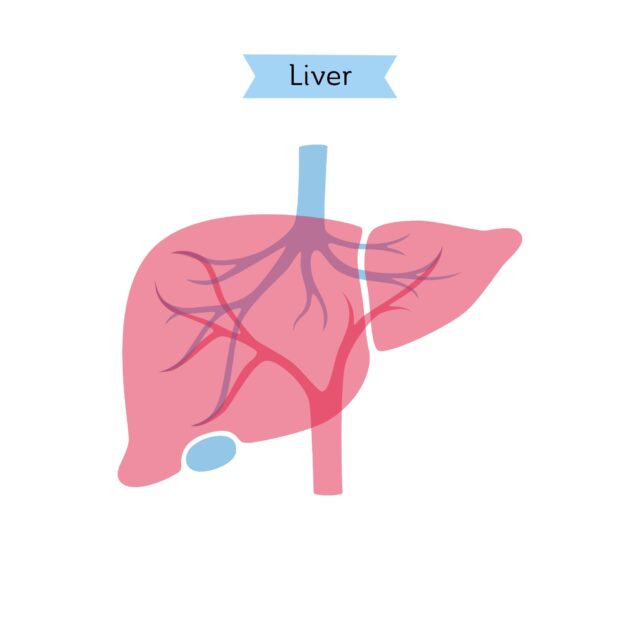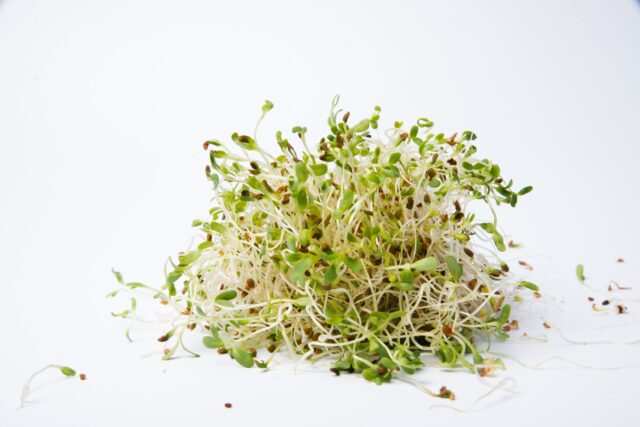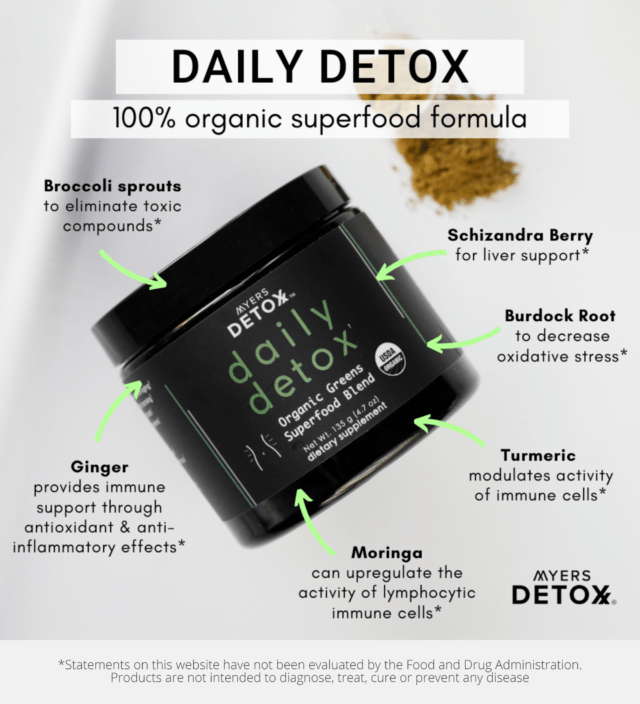Did you know that there’s crosstalk between your heart and your liver and that when one goes out of balance, the other becomes vulnerable to harm as well?
We often think of our organs as individual players, each with their own list of tasks and responsibilities to keep us alive. While it’s true that every organ in your body plays a crucial role in overall health, what’s often overlooked is the influence that our organs have on each other and how the health of one can jeopardize the health of another.
In this article, we’ll discuss:
- How reduced blood flow from your heart can negatively impact your liver
- Why liver function is crucial to a healthy heart
- How metabolic disease drives both heart and liver dysfunction
- The reason your liver is more burdened today than ever before
- Key nutrients that can help your liver detox optimally –for both liver and heart health
- The easiest way to keep your liver healthy and your heart happy
Liver Function and Heart Health: The Connection

Studies today leave no room for doubt; your heart and your liver talk to each other, and this two-way street can mean that when one is out of balance, the other follows[1].
Heart failure, for example, can lead to alterations in liver function tests and liver fibrosis. It may also lead to a condition known as cardiogenic ischemic hepatitis, where a sudden drop in cardiac output and blood pressure stops the flow of blood to the liver, resulting in ischemia, shock, and a spike in liver enzymes[2].
Cardiac cirrhosis is another term that’s used to describe a spectrum of liver disorders that can happen when the liver becomes congested due to heart failure or other cardiac events. In cardiac cirrhosis, also known as congestive hepatopathy, circulation to the liver is reduced, and therefore so is oxygen. This may cause direct damage to liver tissue and severely impact your liver’s ability to carry out its crucial functions, such as detoxification[3][4].
But as mentioned, communication between the liver and heart is a two-way street, which means that conditions impacting the liver can also damage the heart. In fact, studies show that even early forms of liver disease may have detrimental effects on the heart. In research conducted at Cedars-Sinai, investigators found that 86% of patients presenting with signs of liver fibrosis showed cardiac abnormalities on their MRIs[5].
Other complications that can arise in the heart due to liver dysfunction include portopulmonary hypertension (hypertension in the portal vein and lungs), pericardial effusion (buildup of fluid in the space around the heart), and cirrhotic cardiomyopathy – which is estimated to be present in up to 50% of patients with cirrhosis[6][7][1][8].
Perhaps one of the most concerning conditions, however, is non-alcoholic fatty liver disease (NAFLD). Studies show that one in four adults in the United States have NAFLD, and this condition greatly increases the risk of heart failure[9].
Patients with NAFLD show a higher presence of coronary plaques, impairment in endothelial function, as well as impaired coronary microvasculature – all signs of poor heart health. Studies also show that NAFLD may increase the risk of heart arrhythmias and, therefore, heart failure or sudden cardiac death[10][11][12][13][14].
While the exact mechanisms connecting NAFLD to heart failure are not fully understood, some assumed contributing factors include insulin resistance, inflammation, oxidative stress, dyslipidemia (imbalanced blood lipids), and visceral fat. All of these factors contribute to metabolic syndrome, which is closely related to both NAFLD and heart disease[15].
Why Our Livers Are Struggling Today (More Than Ever)
In addition to the influence that poor heart health can have on your liver, the world today is a landmine for toxic insults. As a result, your liver not only has to perform its everyday functions (of which there are over 500) but also has to take on a slew of environmental factors that, centuries ago, it would have never been tasked with[16].
Some examples include heavy metals such as mercury, cadmium, lead, and more, which are now found ubiquitously in our air, food, water, and personal care items. And then there are endocrine-disrupting compounds such as BPA, parabens, phthalates, and PFAS, which are in our food supplies, home goods, clothing, and more. And, of course, we can’t forget the pesticides and herbicides sprayed on most conventional produce. Truly, the list could go on, but you get the point – our world today is much more toxic than ever before, and our livers are taking the brunt.
Whether your heart impacts your liver or your liver impacts your heart, when your ability to detox gets shunted, shut down, or overwhelmed, major problems can occur. This is one of the (many) reasons that giving your liver an extra boost is so crucial to overall health and longevity.

I truly believe that our livers today are at the seat of so many people’s health issues. The liver performs so many functions in the body. So it makes sense that optimize liver function and doing a multitude of things to care for the liver go a long way to dramatically improving your health, including your heart health.
So, how do we best support our livers and their ability to tackle a world of toxins? That’s where we’re going next.
How To Support Your Liver And Promote Heart Health
The obvious first step in supporting your liver is doing your best to avoid environmental toxins. That said, as we just covered – these compounds are everywhere. Unless you plan to live in a bubble or move deep into nature where modern advances can’t find you, your body likely needs extra support.
Below are some of the hardest-hitting foods and herbs for liver support to include in your diet or supplement regimen.
#1 Milk Thistle
Milk thistle is one of the most well-known liver-supportive herbs, with its use dating back thousands of years in herbal medicine as a key medicinal plant for all types of liver dysfunction, including hepatitis, cirrhosis, fatty liver, and general liver protection.
The key nutrient in milk thistle is silymarin, which is actually a group of flavonoids (phytonutrient antioxidant compounds). Silymarin is said to have several positive impacts on liver tissue, including anti-inflammatory, antioxidant, and anti-fibrotic. These compounds are thought to not only protect liver cells but also to help repair ones that are damaged by alcohol, drugs, and other toxic substances[17].
Furthermore, research suggests that silymarin may help to protect your liver from toxic insults, which, as you now know, are a constant threat in our modern environment[18].
#2 Burdock Root
Burdock is another liver superstar with hundreds, if not thousands, of years of traditional use. In Traditional Chinese Medicine (TCM), burdock is known to detoxify the blood and promote healthy circulation[19]. As such, it’s used to treat various conditions, including aging skin, digestive issues, joint swelling and inflammation, sore throats and colds, and all types of infections.
In one study, investigators found that burdock was able to improve the liver’s antioxidant defenses and turn around alcohol-induced liver damage in rats[20].
Interestingly, research shows that burdock may be able to alleviate fatty acid accumulation in the liver in those with NAFLD[21].
#3 Broccoli Sprouts
Broccoli sprouts are an incredibly nutrient-rich food with high levels of sulforaphane (SFN) – a compound that enhances your body’s stores of glutathione. Glutathione is a master antioxidant that can help to protect your cells against oxidative damage of all kinds.
Not surprisingly, studies show that broccoli sprouts, due to their SFN content, positively protect liver function in people with liver disease. In fact, serum biomarkers of liver dysfunction, including liver enzymes and oxidative stress, were all significantly improved after two months of broccoli sprout supplementation[22].
Although several mechanisms may be at play, broccoli sprouts’ ability to increase antioxidant defenses and reduce oxidative stress in the liver is certainly a strong contributing factor[23].
#4 Dandelion
Many liver-supportive tea blends include dandelion – and for good reason.
Dandelion is rich in phytochemicals and nutrients that may protect the liver against injury. For example, research shows that dandelion contains polyphenols, lecithin, inositol, and a rich blend of vitamins and minerals. These nutrients support the many health-promoting activities of dandelion, which include antioxidant, anti-inflammatory, diuretic, and hepatoprotective[24].
In animal research, dandelion extract was shown to improve fat metabolism and improve fat accumulation in the liver while maintaining normal liver tissue function due to its antioxidant and anti-inflammatory activity[25].
Furthermore, dandelion is known as a choleretic plant, which means it helps produce bile from the liver. Bile production is critical to proper detox, as toxins are removed from the body via the flow of bile into the digestive system[26].
#5 Turmeric
Turmeric is another herb that’s been around for thousands of years, widely used in traditional systems of medicine like Ayurveda and Traditional Chinese Medicine (TCM). This yellow-orange spice is a powerhouse with properties that are said to heal a range of imbalances from arthritis to eye disease to muscle soreness, and much more.
Curcumin, turmeric’s primary bioactive compound, is well-known for its anti-inflammatory activity, and studies show that curcumin may have a protective effect on liver function by normalizing liver enzyme activity while enhancing antioxidant defenses[27].
Research also shows that curcumin supplementation may help improve liver fat accumulation, a cardinal sign of NAFLD. In people with MAFLD (metabolic dysfunction-associated fatty liver disease), curcumin supplementation resulted in lower fasting blood sugar, improved cholesterol levels, lowered body mass index, and significantly lower fatty acid accumulation in the liver[28].
Furthermore, in liver tissue studies conducted in animals, researchers found that curcumin supplementation significantly reduced liver fibrosis and the number of necrotic (or damaged) cells[28].
#6 Barley Grass
Barley grass is rich in vitamins, minerals, and phytochemical antioxidants, which is why we often see people taking a shot of barley grass when they want a hit of greens.
Studies show that barley grass may be particularly beneficial for liver health, improving the damage caused by toxins on a tissue level[29].
Interestingly, research shows that barley grass not only helps your liver detox but also supports detoxification in your skin – helping you look more youthful[30].
All-In-One Liver Support
All of the above foods and herbs provide unique and powerful benefits for liver function. Ideally, we would get a healthy mix of all of these every day. But in reality, most of us don’t even have enough time to cook for ourselves – never mind tailor our diets specifically to support liver function.
And even if we did, the truth is that many of the nutrients that support liver health taste quite bitter.
This is why I decided to combine the best of the best nutrients for liver support and put them in an easy-to-consume formula that you can sneak into your diet every day in less than 30 seconds.
Daily Detox is my all-in-one liver support formula that not only includes all of the herbs and foods mentioned in this article but it also provides whole-body support for health and longevity.
In addition to liver detox-specific nutrients, Daily Detox provides:
- A digestive fiber blend that helps move toxins out of the body
- Metabolic support to help with issues like blood sugar imbalances, which can lead to fatty liver and other liver and heart related complications.
- Superfoods that are loaded with antioxidants for an even greater boost in protection against environmental toxins
- An anti-aging blend for deep tissue rejuvenation
Daily Detox is meant to make caring for your body easy. In a world that’s full of toxic compounds, it’s no longer enough to do a yearly cleanse; we need nutrients that can support us every day. Daily Detox is gentle enough for everyday detox yet powerful enough for effective cleansing.
Takeaway
Every system in your body works in coordination with each other. Some are more obvious – like your liver and digestive tract, for example. Others, however, are more nuanced.
While we may still be learning about all the intricate ways your liver and heart communicate and impact each other, what’s abundantly clear is that the health of one can significantly influence the health of the other.
If your liver is struggling to keep up with its daly demands, your heart may feel the consequences. Similarly, if your heart is under stress, it can damage your liver’s ability to keep toxins at bay.
Either way, if you’re unable to move toxic compounds out of your body, matters will only get worse (for both your heart and your liver).
Take care of your liver and your heart by providing your body with daily liver-supportive nutrition, like that found in Daily Detox.
*This article is for informational purposes onl












